Last Updated on January 21, 2026
Across the UK, energy-efficient electric heaters remain popular for their low upfront costs, portability and efficiency. Last winter, 17% of households used portable electric heaters as their main heating source.
Whether you’re looking for a top-rated low-energy electric heater for your bedroom or a cost-effective space heater to take the edge off chilly evenings, there’s no shortage of options.
Electric heaters can be more economical when used sparingly compared to heating the whole home with central heating; however, not all heaters are created equally. So, in this expert guide, we’ve reviewed and ranked the most energy-efficient electric heaters available in the UK.
Whether you’re heating a conservatory, a small home office, or simply looking to cut down on central heating use, we help you identify the best electric heater for your needs – and your budget.

Energy Efficient Heaters At a Glance
- Best Energy-Efficient: Könighaus Infrared Space Heater
- Best Smart Features: Devola Smart Wi-Fi Glass Panel Heater
- Best Long-Lasting Heat: VonHaus 11-Fin Oil-Filled Radiator
- Best Space-Saving: De’Longhi Slimline Convection Heater
- Best Luxury: Herschel Comfort Infrared Panel
- Best Budget Panel Heater: Princess Smart Infrared Panel Heater
1. Princess Smart Infrared Panel Heater
Most economical electric heater
Designed for efficient room heating, offering simple controls and useful features to help you manage running costs effectively.
Overall, the Princess Smart Panel Heater offers good value for those who want an economical electric heater that is easy to use and well-suited to short-term heating in smaller spaces such as bedrooms, offices or conservatories.
Pros: Lightweight; smart; economical to run
Cons: Not powerful enough for full-room heat
Price: ~£179
Energy Use: Approx. £0.34/hour at 1.2kW
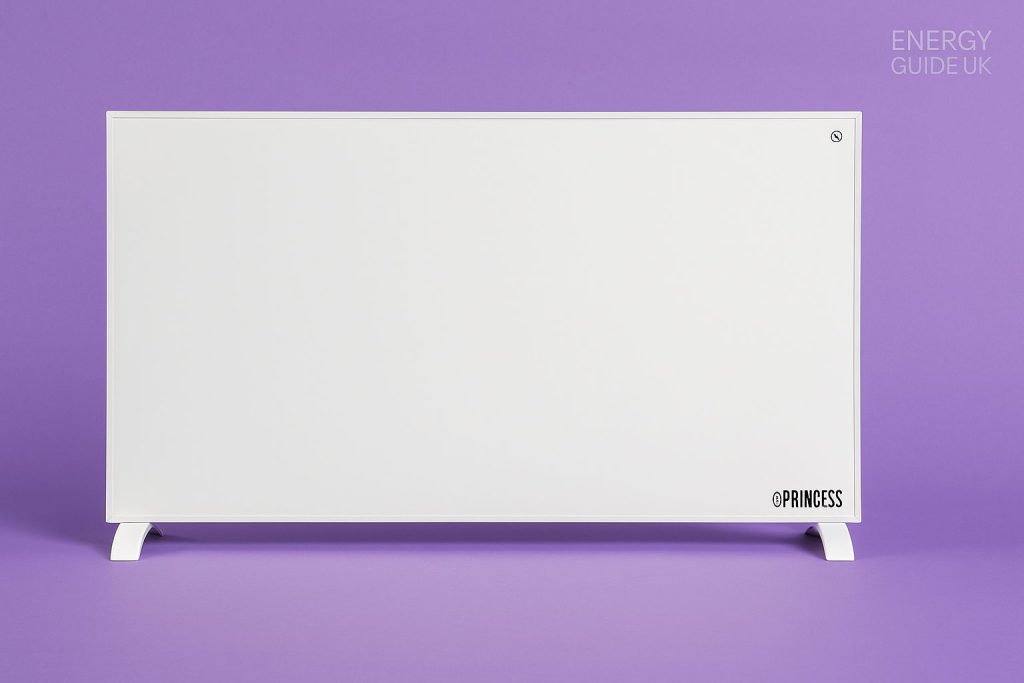
2. Könighaus Infrared Space Heater
Most energy-efficient electric heater
The Könighaus infrared panel is a minimalist, low-profile heater that sits flush against the wall or freestanding. With its sleek white panel, built-in thermostat and timer, it delivers consistent, silent warmth using 800 W of infrared heat—ideal for keeping a specific room toasty without noise or moving parts. It’s energy-efficient too, offering rapid, targeted heat without wasting power on ambient air warming.
Value-wise, it’s competitively priced and backed by a 10-year resistance guarantee. Users appreciate its maintenance-free reliability, though some note it doesn’t include feet or brackets out of the box.
Pros: Whisper-quiet; sterling energy efficiency and long warranty
Cons: No mounting hardware included; thermostat is basic
Price: £138–140
Energy Use: Approx. £0.27/hour at 800W
It delivers consistent, silent warmth ideal for keeping a specific room toasty without noise or moving parts.
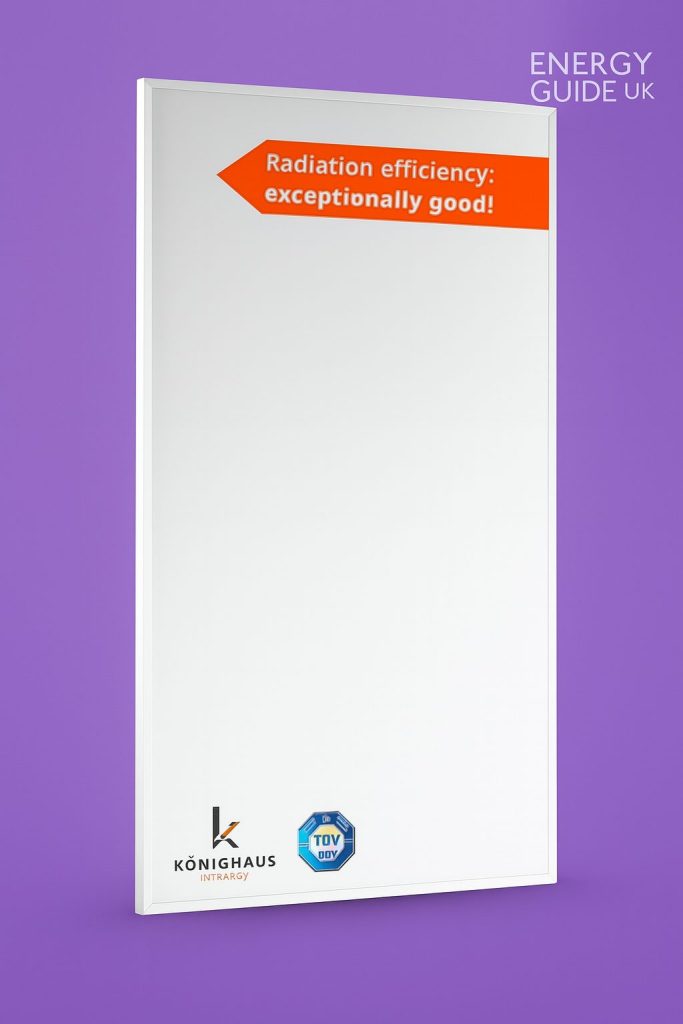
3. Devola Smart Wi-Fi Glass Panel Heater
Best smart features
The Devola smart panel heater combines clean aesthetics with strong functionality. It features Wi-Fi connectivity, app control, eco-mode, and built-in thermostats—all accessible through a sleek touchscreen interface or smart assistant integration.
It’s wall-mountable or freestanding and offers faster heat than traditional oil-filled units. While the glass finish is attractive, it’s prone to showing smudges, and the unit itself is less portable due to its weight.
Pros: Smart app control, modern looks, quick heating
Cons: Heavy and slightly bulky for frequent moving
Price: ~£120
Energy Use: Approx. £0.30/hour at 1.5kW
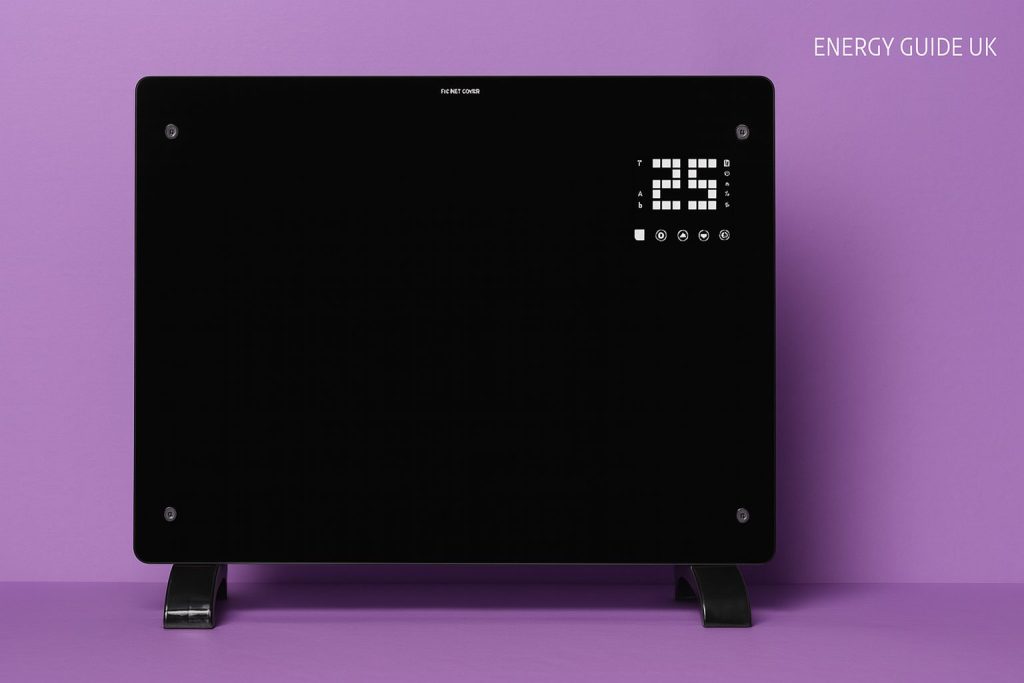
3. VonHaus 11-fin Oil-Filled Radiator
Best for long-lasting heat
This classic oil-filled radiator is ideal for quiet, long-lasting background warmth. It takes time to heat up, but it retains heat exceptionally well once running. The design is traditional— large, wheeled, and sturdy, with adjustable settings for the timer and thermostat.
Best suited for medium to large rooms, this model offers excellent value for budget-conscious buyers looking for solid, sustained heat output. However, it’s not the most stylish option on the list.
Pros: Holds heat well, low cost for long heating sessions
Cons: Bulky; takes longer to warm up
Price: ~£64
Energy Use: Approx. £0.71/hour at 2.5kW
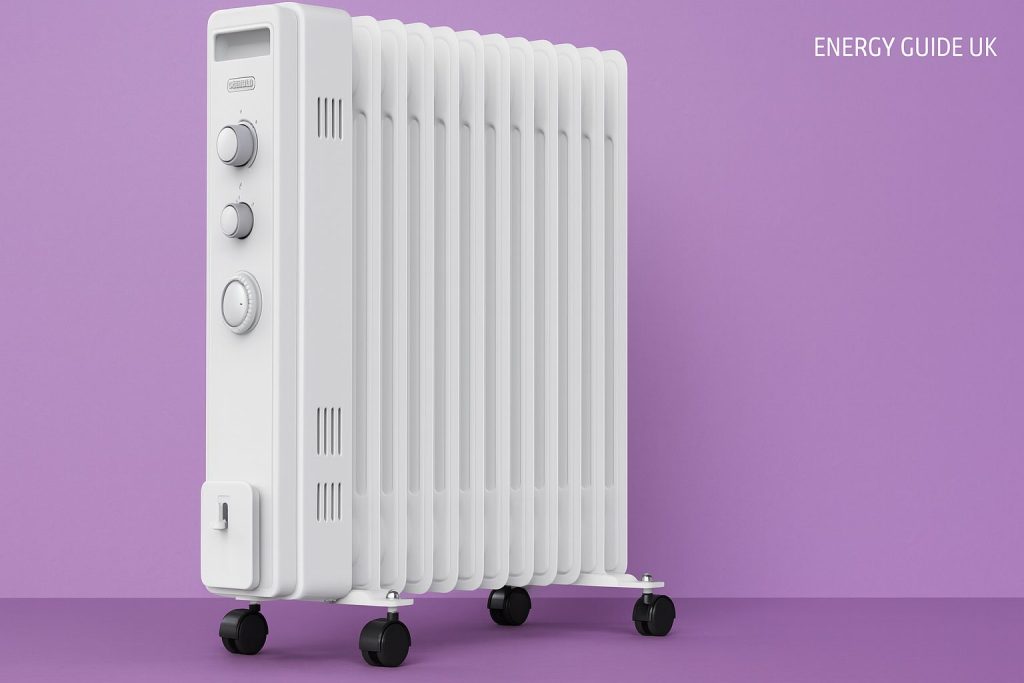
4. De’Longhi Slimline Convection Heater HSX4324E
Most space-saving
Slim, stylish, and smarter than it looks, with three heat settings to match your mood, the De’Longhi HSX4324E is known for its quick room-warming ability and sleek profile. It’s one of the most compact convection heaters available and is ideal for spot heating in smaller or less-used spaces. The eco-mode ensures it doesn’t waste energy once the room reaches the right temperature.
This model is very light and easy to store or move between rooms. However, the LCD controls are placed low and can be tricky to read.
Pros: Fast to heat; lightweight
Cons: Awkward control placement; no smart connectivity
Price: ~£64
Energy Use: Approx. £0.45/hour at 2.0kW (on eco mode)
Slim, stylish, and smarter than it looks — with three heat settings to match your mood.
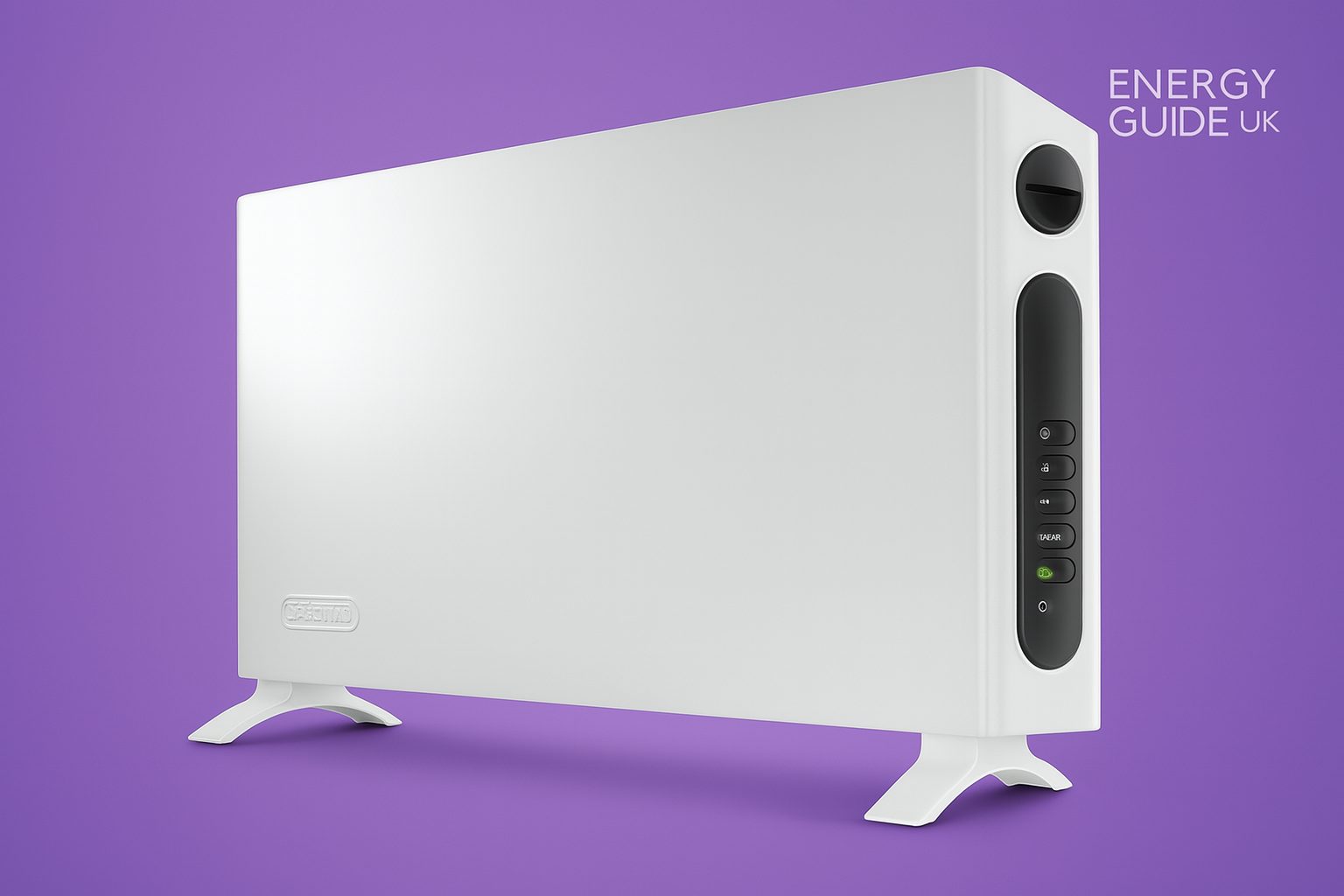
6. Herschel Comfort 850w Infrared Panel Heater
Best luxury buy
This high-end wall-mounted panel delivers premium infrared heating suited for well-insulated homes, offices or extensions. Its silent, radiant heat is efficient, clean, and evenly distributed. The slim glass surface gives a modern feel and adds to the unit’s aesthetic appeal.
It includes smart features for temperature control and scheduling, though it’s not the best option for quick, reactive heating. You’ll get the most out of it in a room that retains heat well.
Pros: Elegant design; smart scheduling
Cons: High upfront cost, best in already insulated rooms
Price: ~£309
Energy Use: Approx. £0.51/hour at 850W
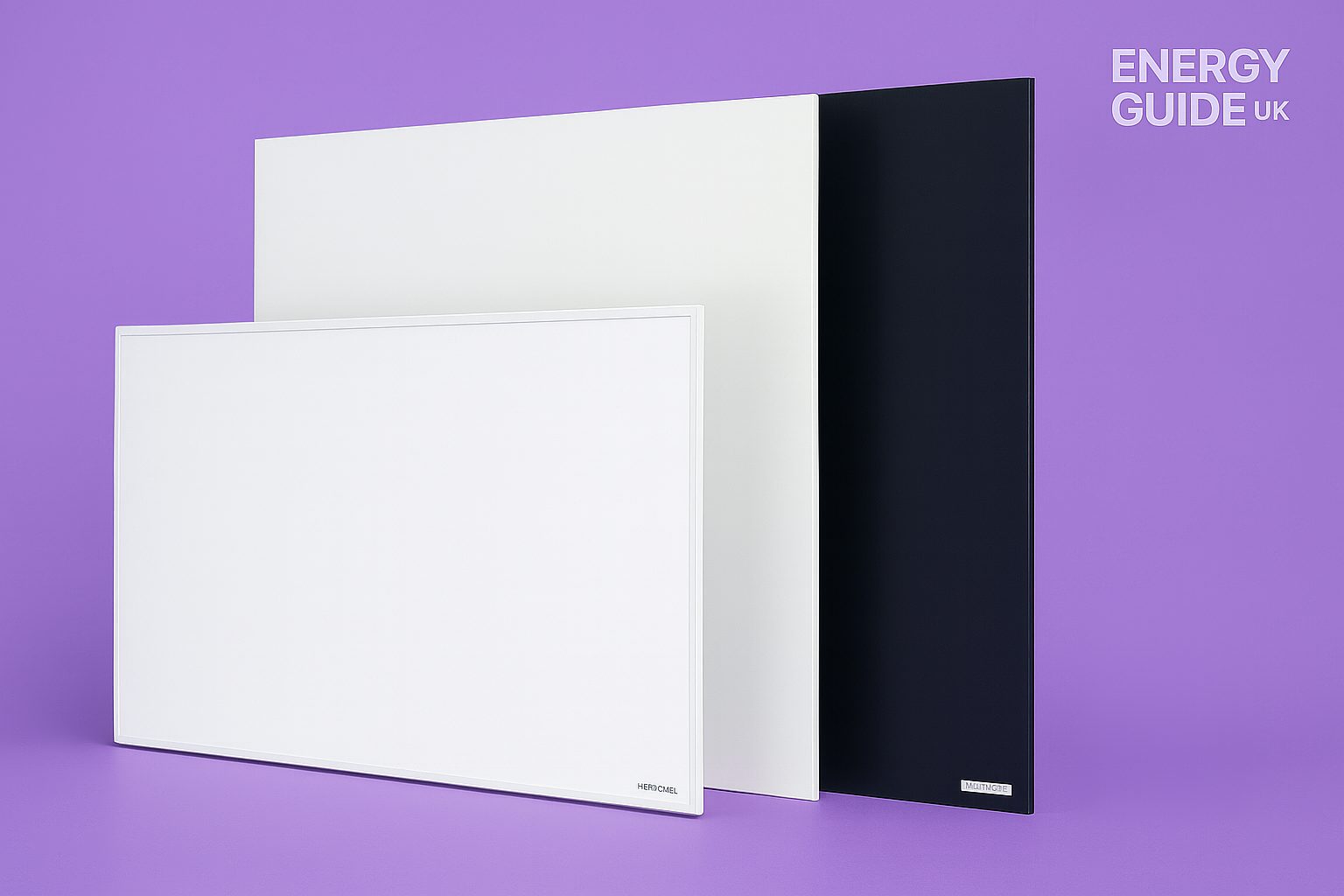
Energy-Efficient Electric Heater Comparison Table
How to Use Electric Heaters Efficiently in the UK:
Here are a few key points to keep in mind:
- Best used for short periods: Electric heaters are ideal for heating a small space (like a bedroom, home office or conservatory) for a limited time, rather than running all day.
- Infrared heaters are the cheapest to run: A 500 W infrared heater running for two hours a day costs roughly 24.5p per day, which equates to just 12p per hour.
- Choose models with a timer: A heater with a timer function helps prevent unnecessary energy use and keeps your running costs in check, especially handy if you often forget to switch it off.
- Thermostat control is key: Opt for an electric heater with an adjustable thermostat so you can fine-tune the temperature to suit the room and the season, avoiding wasted energy.
- Don’t rely on “room size” claims: Manufacturer claims about how many square metres a heater will warm can be misleading. Room size, insulation, ceiling height, and draught-proofing all affect actual performance.
- It’s easy to find well-rated, energy-efficient electric heaters with these features on Amazon UK and other major retailers.
When Should You Use an Electric Heater?
In most UK homes, electric heaters are best used as a secondary or supplementary source of heat.
When deciding whether to use an electric heater instead of your gas central heating, there are several factors to consider:
- the age and insulation of your property,
- the size of the room you want to heat,
- the duration you intend to run the heater, and
- the current cost of electricity vs gas.
On average, gas central heating remains cheaper than electricity in the UK. Running an electric heater can often cost twice as much per hour as heating the same space with a modern gas boiler. However, there are some exceptions:
- If you only need to heat a single room for an hour or two, an efficient electric heater can sometimes be the more cost-effective option, especially if switching on the central heating would heat the entire house unnecessarily.
Types of electric heaters also vary in efficiency:
- Infrared heaters are generally the most economical for steady, targeted heating of small spaces.
- Halogen heaters provide quick, direct warmth but are less efficient over long periods.
- Convector heaters heat the air in a room relatively quickly, but typically use more energy to do so.
- Oil-filled radiators provide gentle, long-lasting warmth but take longer to heat up.
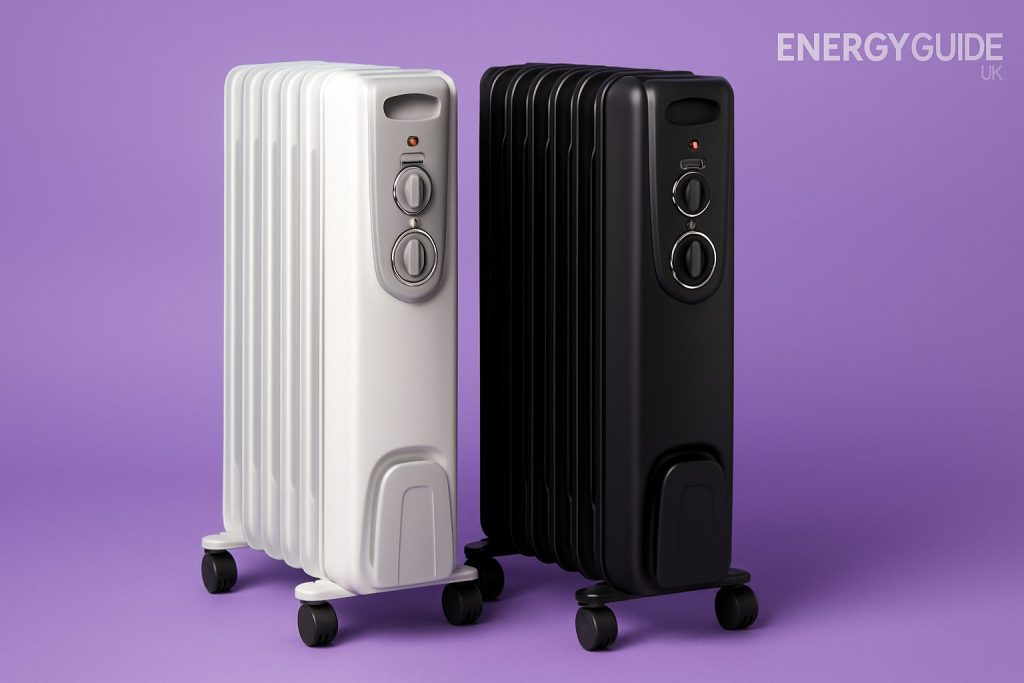
If you are looking for the best electric heater to heat a conservatory or other specific space, it’s worth exploring options carefully. You may be surprised to learn that halogen heaters are not always the most economical choice, particularly when compared with modern infrared heaters or smart panel heaters with timer and thermostat controls.
Electric Heaters vs Central Heating: Which Is Cheaper?
If you’re trying to decide between using an electric heater or your gas central heating, i.e., your boiler, there are a few important points to consider.
UK electricity currently costs around 27.03p per kWh, and the average gas price is 6.99p per kWh, based on the Ofgem price cap (April–June 2025). To put that into perspective:
- At 27 p/kWh, a 1 kW electric heater costs about 27 p per hour to run.
- The same 1 kW of heating via gas would cost only around 7 p per hour, making gas roughly four times cheaper per kWh than electricity.
This means that, in most cases, running an electric heater will be at least twice as expensive as using your central heating to warm the same space.
That said, the decision isn’t always straightforward. Other factors include:
- the age of your property,
- how well it is insulated,
- the size of the room you want to heat, and
- how long you plan to run the heater.
In general:
- If you need to heat the whole house for several hours, your central heating will almost always be more cost-effective.
- If you only want to heat a single room, for a short time—such as an hour or two—an energy-efficient electric heater can be the cheaper option; for example, when you need to warm a bedroom in the evening or top up the heat in a home office.
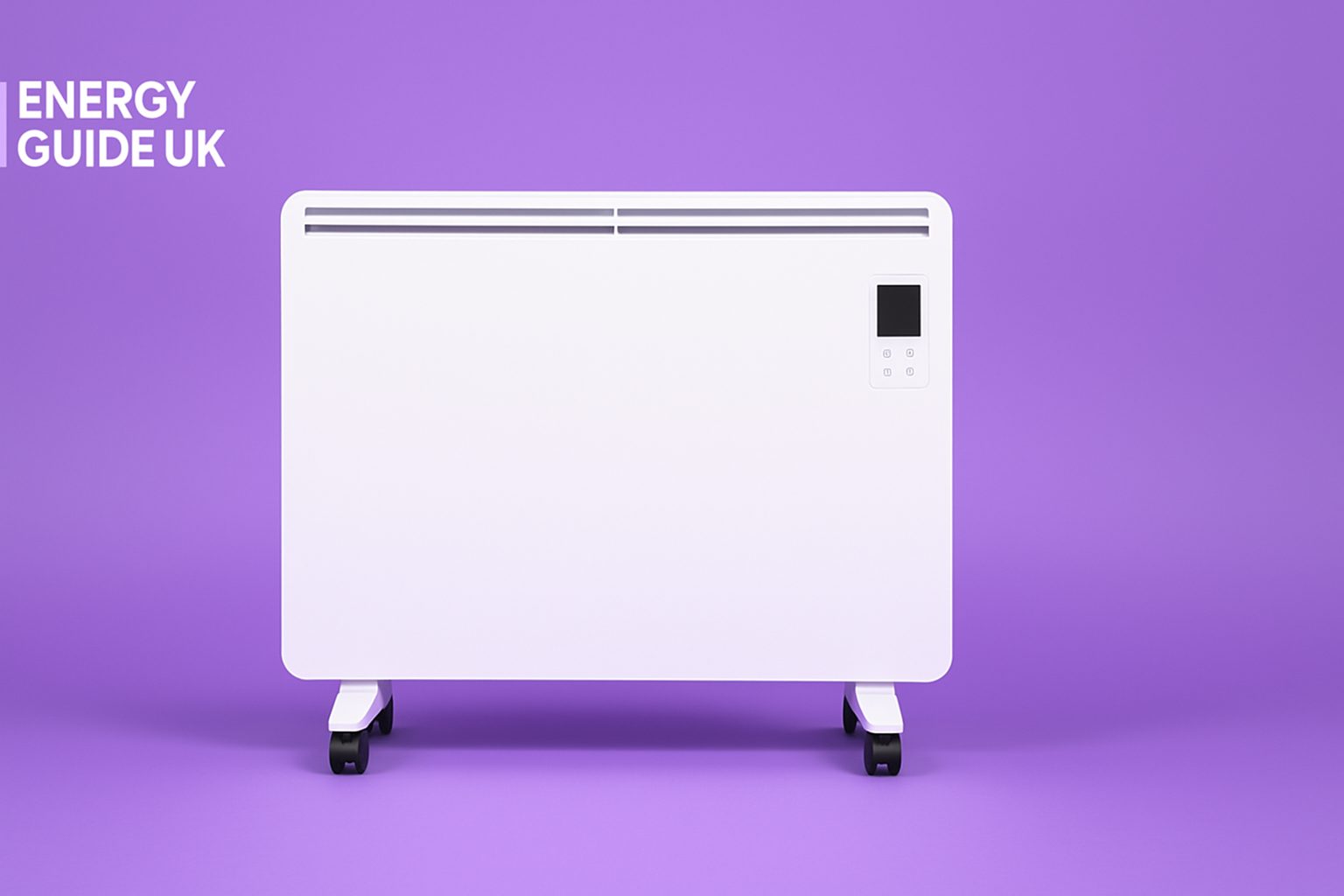
Types of Electric Heaters and How Much They Cost to Run
Prices typically start from around £60 for a basic fan heater or convector, going up to £200 or more for energy-efficient electric heaters with advanced controls and timers.
When comparing models, it’s important to check the energy output, which is usually shown in kilowatts (kW) on the packaging or product description. The higher the kW rating, the more electricity the heater will use, and the higher the running cost per hour.
Here are some of the most common types of electric heaters and what to expect in terms of performance and efficiency:
- Infrared heaters
These are generally the cheapest type of electric heater to run. - Convector heaters
Convector heaters warm the air quickly and evenly. They are useful for heating a room in a short time, but they tend to use more energy than infrared heaters. - Fan heaters
These provide fast, targeted heat and are ideal for occasional use in smaller spaces. However, they are one of the most expensive types of electric heaters to run if used for long periods. - Oil-filled radiators
Oil-filled heaters provide steady, long-lasting warmth. They take longer to heat up but can be more cost-effective when used for extended periods, as the oil retains heat. - Ceramic heaters
A good choice for portable electric heaters. They offer a balance between quick heating and reasonable energy use.
When choosing an energy-efficient electric heater, always consider:
- the size of the space you want to heat,
- the duration of use,
- the heater’s kW rating, and
- whether it includes useful features like a timer and thermostat.
Which type of electric heater is the cheapest to use?
Below, we’ve listed some of the most common types of electric heaters used in UK homes. You’ll find an overview of their average upfront costs, how much they typically cost to run, and practical examples of where each type is most suitable.
Infrared Heaters (the Most Economical Type of Electric Heater)

Infrared heaters work differently from most other electric heaters. Instead of warming the air, they use infrared light to heat objects and surfaces directly, similarly to how sunlight feels on your skin.
This makes them especially effective for small, well-insulated spaces or where you want targeted warmth.
Because they heat people and furnishings rather than the air, less energy is wasted, and they remain one of the cheapest electric heaters to run.
For example:
- A typical 500 W infrared panel costs around 12–16p per hour to operate (based on the current UK electricity price cap of 27.03p/kWh).
- In comparison, many fan or convector heaters can use two to three times more energy for similar warmth.
One thing to keep in mind:
- Infrared heaters often cost more upfront than basic convector or fan heaters, with good models starting from around £125.
- However, if you use an electric heater regularly, the lower running costs will more than offset the higher initial price over time.
For this reason, if you are looking for the most energy-efficient electric heater to use in your home — particularly for small spaces or regular use — an infrared heater is usually the smartest choice.
Ceramic Heaters
Ceramic electric heaters use a ceramic element that heats up and then warms the surrounding air. Many models also include a fan to help circulate the heat around the room more quickly.
They are a common type of portable electric heater found in UK homes. The cost to run a ceramic heater depends entirely on its wattage and how long you use it. Typical models range from 1.5 kW to 2 kW, costing around 40–55p per hour to run at current electricity prices.
Ceramic heaters are a good option if you need quick, portable heat in a small to medium-sized room; however, they are not usually the most economical choice for long-term use.
Oil-Filled Radiators
Oil-filled electric radiators are sometimes thought of as old-fashioned, but modern versions are actually quite energy-efficient and very practical for UK homes.
They provide a steady, long-lasting heat, and because the oil retains warmth even after the unit is switched off, they can help keep a room warm with lower overall energy use.
Another benefit is that they are almost silent, making them a good choice for bedrooms or living spaces. Running costs vary by size, but a typical 1.5–2 kW oil-filled radiator costs about 40–50p per hour to operate.
Space Heaters (Fan Heaters)
Fan heaters — sometimes called space heaters — are familiar to many UK homeowners. They work by heating an element and using a fan to push warm air around the room.
They can provide fast heat and are useful for short-term use in small spaces. However, they are one of the least energy-efficient electric heaters when used for extended periods. Typical models (1.5–2.5 kW) can cost 50–70p per hour to run.
They are popular because they are inexpensive to buy, but many people don’t realise how much electricity they can use, especially if left on for long periods.
Storage Heaters
Storage heaters work differently from most electric heaters. They store heat overnight, using cheaper off-peak electricity tariffs such as Economy 7, and then release that heat throughout the day.
While the upfront cost of a modern storage heater can be higher than other types (starting at around £200–£300), they can be very cost-effective when used correctly. They are best suited to households that already benefit from off-peak electricity rates that want to spread heating costs more evenly.
What is the cheapest way to heat a room with electricity?
If you’re looking to warm a room cost‑efficiently, infrared heaters consistently outperform other electric options.
Why infrared heaters use less electricity
- They heat objects, not air: Infrared panels warm people, furniture, and walls directly, providing lasting heat, even if a door opens, rather than wasting energy warming air that quickly escapes.
- High energy efficiency: Far‑infrared panels convert nearly all (close to 100%) of their electricity into usable heat.
- Voice of experts: The Energy Saving Trust also confirms that infrared panels can be up to 30% more efficient than traditional electric heaters.
Common Misconceptions Addressed
- Not harmful: Infrared heat is simply safe far‑infrared radiation, used in saunas and medical settings, without UV risk.
- Effective in real life: It warms surfaces that re-radiate heat, keeping rooms warmer overall.
Practical Advice for UK Homes
- Best for closed, insulated spaces: Infrared heaters are excellent as a secondary heating source—they’re ideal for heating a bedroom, office or well-insulated conservatory.
- Still more expensive than gas heating: With UK electricity pricier than gas, infrared won’t beat your gas boiler, but for targeted, short-term heating, it’s the most cost-effective electric solution.
- Shop smart: Before buying, check energy output, kW rating, and features like a timer or thermostat to make sure you get the best value.
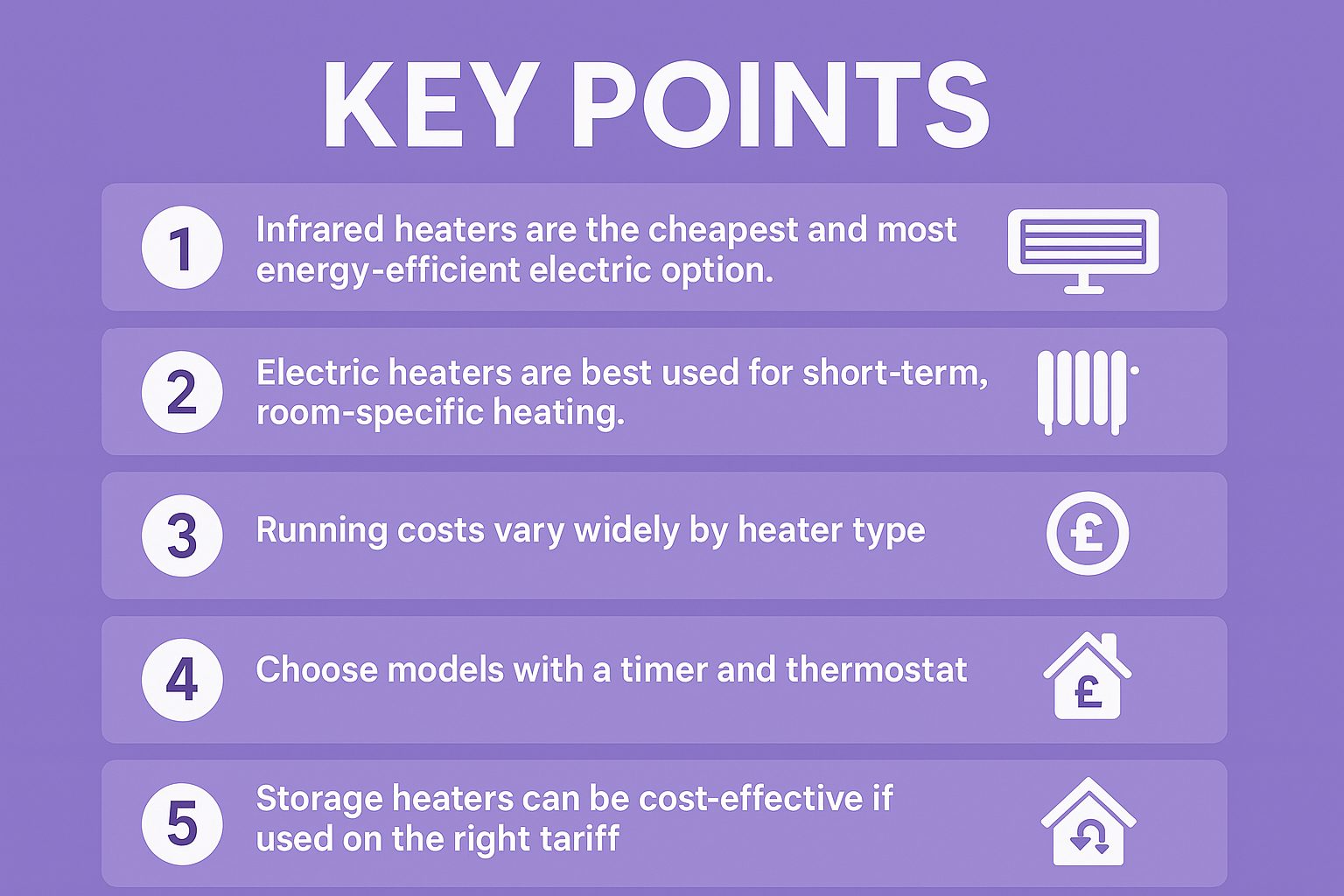
FAQs
1. What is the cheapest type of electric heater to run?
Infrared panel heaters are the cheapest to run. They heat objects and surfaces directly, using less electricity than fan, convector or oil-filled heaters. They are most effective in small, well-insulated rooms.
2. Are infrared heaters safe?
Yes. Infrared heaters are safe for home use. They emit far-infrared heat, which is similar to natural warmth from the sun and contains no harmful radiation.
3. When should I use an electric heater instead of central heating?
Use an electric heater when you only need to heat one room for a short time. It’s more efficient than running central heating for the whole house, especially if you’re using an infrared heater with a timer and thermostat.
Sources
https://energysavingtrust.org.uk/
https://suryaheating.co.uk/energy-savings-of-infrared-panel-heaters-vs-gas-and-electric-heaters/?
https://bionic.co.uk/business-energy/guides/price-cap/?
https://www.idealhome.co.uk/house-manual/heating/are-infrared-heaters-cheap-to-run?